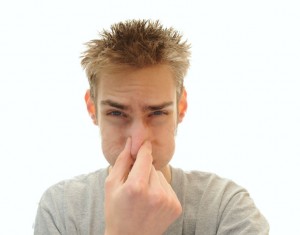Fireplace Odors
Fireplaces are supposed to be seen and felt, not smelled — and when everything in your chimney system is working correctly, that’ll be the case. If you’re noticing a musty, smoky or otherwise unpleasant odor coming from your fireplace, that’s a pretty good indication that a problem is afoot.

Some smells coming from your fireplace are normal byproducts from burning. Others indicate a need to schedule a cleaning and inspection of your chimney.
Your problem might just be a need for simple maintenance, or you might have a leak — Mason’s Chimney Service can figure out your system’s specific needs are during a chimney system video inspection. But here are just a few of the culprits that we find often lead to fireplace odors:
You’re Overdue For A Chimney Sweeping Appointment
When you burn a fire in your fireplace, hot gases carrying different byproducts rise in your chimney, and meet the cooler chimney walls. That creates condensation, and that condensate becomes creosote, a sooty, highly combustible deposit that thickens over time. Creosote has a smoky, musty odor, and the more creosote you have on your flue walls, the more likely it is that the odor will transfer to your living area. Having your chimney swept by the professional, CSIA-certified sweeps at Mason’s can often clear up that odor (https://www.masonschimneyservice.com/chimney-fireplace-services/chimney-sweeping/).
Water Is Intruding Into Your Chimney
If water begins to make its way into your flue, it can lead to a variety of unpleasant results, from bring out the smoky funk of creosote to creating a mildewy, musty smell. The methods of fixing that intrusion will depend on the cause — if your masonry has worn down, or if there’s damage to any number of parts that help protect against water intrusion. Mason’s technicians can help figure out the best repairs during an inspection. A few of the simplest, most common fixes: installing a new chimney cap to keep rain from coming right into the flue, and applying a waterproofing sealant, specially formulated for masonry, to your chimney’s exterior.
Animals Have Made A Home In Your Chimney
Lots of animals are drawn to chimneys as a place to nest and live, from birds to squirrels, raccoons and bats. And nesting animals tend to bring along a lot of odors. Unfortunately, many animals often end up dying in chimneys if they’re unable to climb up and out, which leads to unsanitary conditions, bugs and terrible odors. Mason’s technicians can remove animals and debris from your chimney, and prevent nesting animals from getting in again, by installing a properly sized chimney cap.
Your Chimney Has Drafting Or Performance Issues
If proper draft is occurring in your chimney, and air is moving up and out, smoky creosote smells likely won’t make it into your living area. But if the chimney’s performance is held back by an obstruction, poor design or a wind-induced downdraft, odors can easily start coming your way. We can inspect your chimney for performance issues, and suggest fixes.
Fireplace odors are never welcome, but they’re almost always fixable — and Mason’s can help!
